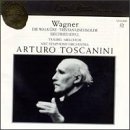| All Artists: Wagner, Toscanini, NBC Title: Die Walkure / Tristan & Isolde / Siegfried Members Wishing: 0 Total Copies: 0 Label: RCA Release Date: 3/8/1991 Genre: Classical Styles: Opera & Classical Vocal, Forms & Genres, Symphonies Number of Discs: 1 SwapaCD Credits: 1 UPC: 090266026425 |
Search - Wagner, Toscanini, NBC :: Die Walkure / Tristan & Isolde / Siegfried
CD Details |
CD ReviewsVibrant Wagner performances Robert E. Nylund | Ft. Wayne, Indiana United States | 01/24/2006 (5 out of 5 stars) "In Carnegie Hall in February 1941, Arturo Toscanini conducted the NBC Symphony Orchestra and soloists Helen Traubel and Lauritz Melchior in excerpts from the operas of Richard Wagner. Toscanini also made it clear that he considered Wagner a master composer and he definitely brought the best from the innovative opera scores.
Wagner, along with Franz Lizst and Hector Berlioz, were the promoters of the "New Music," a more advanced, more adventurous, and more mature brand of Romanticism. All three composers were known for their lush orchestrations, often relying on the largest orchestras assembled up to that time. Toscanini frequently performed the music of Wagner and Berlioz, while playing very little of Lizst. The 1941 broadcast concert, fortunately preserved on recordings, was a great triumph for Toscanini, Traubel, Melchior, and the NBC musicians. The American-born Traubel had a powerful voice that went well with the heroic singing of the Danish-born Melchior and they enjoyed a wonderful collaboration, particularly during the war years in which the leading Wagnerian soprano, Kirsten Flagstad, had returned to her home in Norway to be with her husband, whose political sympathies were later challenged. Sadly, Traubel's career would not endure and she would later have trouble projecting her voice in Rodgers and Hammerstein's ill-fated musical "Pipe Dream." In these performances, however, Traubel was at the peak of her abilities and her singing, along with Melchior's, is quite thrilling. As so often happened, Toscanini succeeded in bringing out the best from his singers, as well as the music. As the music from Act I of "Walkure" reaches its overwhelming climax, Toscanini seems to raise the roof in the intensity and power of the performance until it seems impossible to surpass. The audience finally bursts into a tremendous ovation as the act ends. In the other excerpts the orchestra shines brilliantly, giving definitive performances of music that has never been surpassed. Wagner wrote particularly well for brass and strings and the NBC musicians excelled in their precise, intense playing, as they responded to Toscanini's more than capable leadership. Here is yet another opportunity to hear how well Toscanini understood Wagner's music. Toscanini's abilities were not lost on Wagner's family, who invited the Maestro to become the first non-German to conduct Wagner's music at the prestigious music festival in Bayreuth,Germany, in 1930. What a shame that those performances, which occurred in the year that both widow Cosima and son Siegfried died, were not recorded. However, so much of Wagner's music WAS later recorded by Toscanini and can still be enjoyed today, sounding better than ever due to digital remastering and superior equalization. " |

